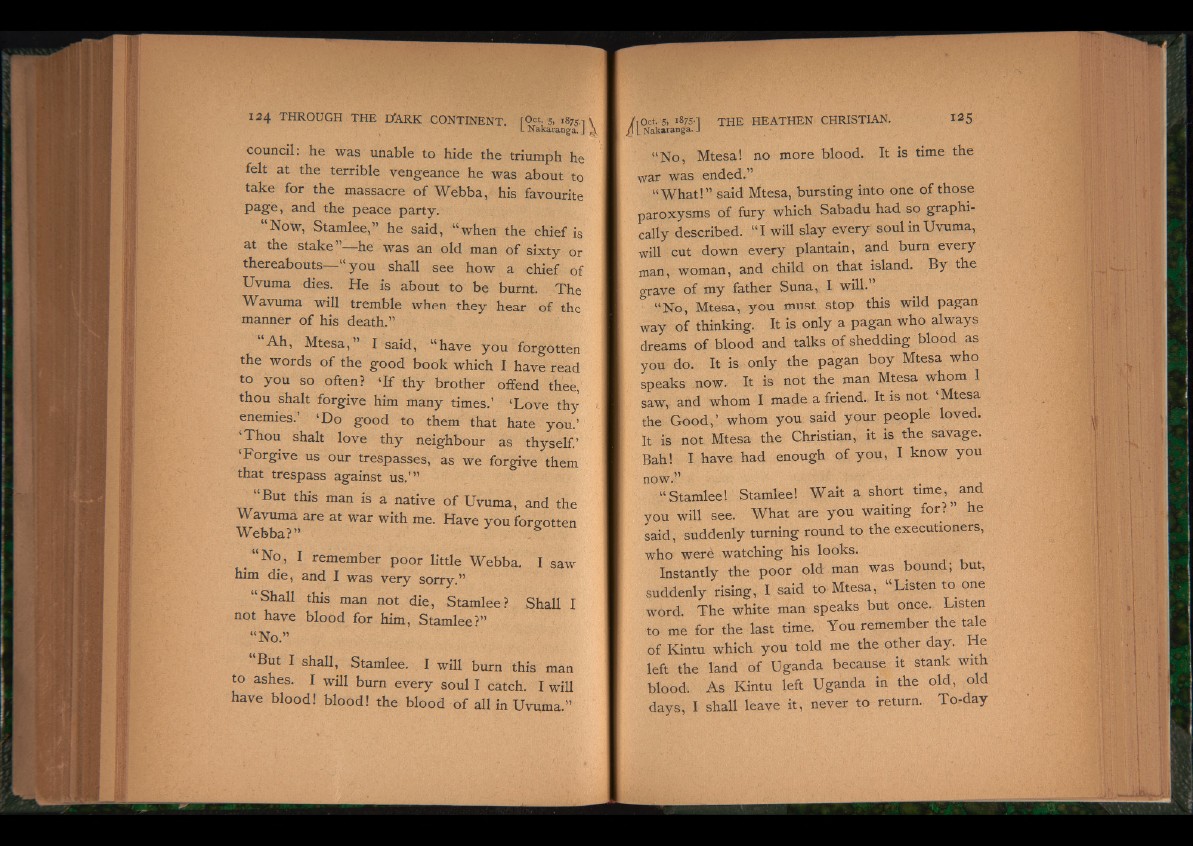
council: he was unable to hide the triumph he
felt at the terrible vengeance he was about to
take for the massacre o f Webba, his favourite
p a g e , and the peace party.
“ Now, Standee,” he said, “ when the chief is
at the s ta k e ”— he was an old man o f s ix ty or
thereabouts— “ yo u shall see how a chief of
Uvuma dies. He is about to be burnt. The
Wavuma will tremble when th ey hear o f the
manner o f his death.”
A h , M te sa,” I said, “ have yo u forgotten
the words o f the good b ook which I have read
to you so often? ‘ I f th y brother offend thee,
thou shalt forgive him many times.’ ‘L o v e thy
enemies. ‘Do go od to them that hate you.’
Thou shalt love th y neighbour as thyself.’
Fo rg ive us our trespasses, as we forgive them
that trespass against us.’ ”
But this man is a native o f Uvuma, and the
Wavuma are at war with me. Have you forgotten
Web b a?”
■ “ No, I remember poor little Webba. I saw
him die, and I was v e ry sorry.”
“ Shall this man not die, Standee? Shall I
not have blood for him, Standee?”
“ No.”
But I shall, Stamlee. I will burn this man
to ashes. I will burn every soul I catch. I will
have blood! blood! the blood o f all in Uvuma.”
“ No, Mtesa! no more blood. It is time the
war was ended.”
“W h a t!” said Mtesa, bursting into one of those
paroxysms o f fury which Sabadu had so graphically
described. “ I will slay every soul in Uvuma,
will cut down every plantain, and burn every
man, woman, and child on that island. B y the
grave o f my father Suna, I will.”
“No, Mtesa, yo u must stop this wild pagan
way o f thinking. It is only a pagan who always
dreams o f blood and talks o f shedding blood as
you do. It is only the pagan b o y Mtesa who
speaks now. It is not the man Mtesa whom I
saw, and whom I made a friend. It is not Mtesa
the G o o d ,’ whom yo u said your people loved.
It is not Mtesa the Christian, it is the savage.
Bah! I have had enough o f y o u , I know yo u
now.” ,
“ Stamlee! Stamlee! W a it a short time, ^ and
you will see. What are y o u waiting for? ” he
said, suddenly turning round to the executioners,
who wer£ watching his looks.
Instantly the poor old man was bound; but,
suddenly rising, I said to Mtesa, “ Listen to one
word. T he white man speaks but once. Listen
to me for the last time. Y ou remember the tale
of Kintu which y o u told me the other day. He
left the land o f Uganda because it stank with
blood. A s Kintu left Uganda in the old, old
days, I shall leave it, never to return.. To-day